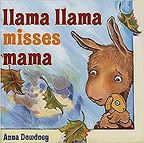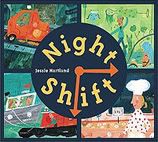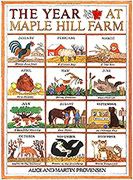 The top of this list would have to be Llama Llama Misses Mama by Anna Dewdney, a book that describes a little llama (star of several other books) on his trepidatious first day at preschool, initially so overcome with missing his mama that he's unable to participate in any of the fun taking place around him, but eventually getting sucked in by the kindness of the teacher and kids and having a good time. Top quotes: "Don't be sad now, little llama! It's ok to miss your mama. But don't forget: when day is through, she will come right back to you!" and "Llama Llama, please don't fuss; have some fun and play with us!"
The top of this list would have to be Llama Llama Misses Mama by Anna Dewdney, a book that describes a little llama (star of several other books) on his trepidatious first day at preschool, initially so overcome with missing his mama that he's unable to participate in any of the fun taking place around him, but eventually getting sucked in by the kindness of the teacher and kids and having a good time. Top quotes: "Don't be sad now, little llama! It's ok to miss your mama. But don't forget: when day is through, she will come right back to you!" and "Llama Llama, please don't fuss; have some fun and play with us!"
I initially got this book from the library to help introduce Speck to the idea of preschool, to help her visualize what might be there, how she might be scared and/or might have fun. I thought it might give us some entries to talk about that stuff, and indeed it did, much more than I anticipated. She asked about the line "Mama Llama goes away; Llama Llama has to stay", and we developed a set of discussion points such as "mama has to go to work" and "preschool isn't for mommies!" We talked about the little llama turning away from games and fun, and how he was missing out on possibilities. We speculated that he probably didn't really "hate that book" but was just feeling grumpy and unwilling to give it a chance. We grinned over the way he shouted and dropped his crayons when he saw his momma returned to pick him up, and laughed when she tried to fit inside the playhouse. Most amazingly, we read this book over and over, day after day, exhausting our library renewals and then getting it out again and repeating the process, long after Speck had made her own successful transition to preschool, long after I should probably have already bought the book but kept imagining we'd be done with it soon.
Reading this book (and the next) also became linked to having a snack of matzohs and cream cheese in the afternoon; either could suggest the other. But there was never a single pass through this book. It's been at the library for a month or two now, but writing this has made me realize that I should probably go and get it out again and see what new tidbits it might have to offer... Next up is Night Shift, by Jessie Hartland. This is a rare case where I brought home a library book whose illustration style (something like chaoticized child's drawings) I actively disliked, because it seemed like a neat topic: what sorts of work goes on around a city in the evening hours and overnight, that you never get to see? We visit boat captains moving freight, a museum guard listening to a late-night DJ, and donut bakers getting their wares ready before dawn, among many others. It's long (which appears to be a draw for Speck in certain moods), but offers nice linkages from one player to the next to pull us along until the late-nighters and the early-morningers all meet at a diner for breakfast.
Next up is Night Shift, by Jessie Hartland. This is a rare case where I brought home a library book whose illustration style (something like chaoticized child's drawings) I actively disliked, because it seemed like a neat topic: what sorts of work goes on around a city in the evening hours and overnight, that you never get to see? We visit boat captains moving freight, a museum guard listening to a late-night DJ, and donut bakers getting their wares ready before dawn, among many others. It's long (which appears to be a draw for Speck in certain moods), but offers nice linkages from one player to the next to pull us along until the late-nighters and the early-morningers all meet at a diner for breakfast.
Anyway, she loves it, and it's another that has been read and read until her parents nearly groan to see it coming out of the pile. But there's lots of detail and silliness to pick out along the way, as well as questions to ask about how the world works -- why is there less traffic at 2am? why do the bridge painters paint around a hawk's nest? etc. Speck particularly likes following some oscelots from their shipping crates to their cage in the nocturnal section of the zoo, through various edge-of-the-action cameos (and maybe a diner outing at the end). Anyway, the book has won me over, what with all the rereadings and examination of details, and I now look upon its multicolored pages with affection. Finally, we made a great find in The Year at Maple Hill Farm, by Alice and Martin Provensen. I thought that this might be kind of a stretch for my 2-year-old when I brought it home, but she was entranced with it immediately and had us read it obsessively until she had memorized whole sets of the shorter descriptions. It talks about the months and seasons of the year by way of how they affect the activities of the animals who live on a farm, with horses feeling frisky in the spring and roosters dealing with the indignity of moulting, and does a good job of evoking the seasonal sensibilities of life on a farm without the need for a treacly or historical patina.
Finally, we made a great find in The Year at Maple Hill Farm, by Alice and Martin Provensen. I thought that this might be kind of a stretch for my 2-year-old when I brought it home, but she was entranced with it immediately and had us read it obsessively until she had memorized whole sets of the shorter descriptions. It talks about the months and seasons of the year by way of how they affect the activities of the animals who live on a farm, with horses feeling frisky in the spring and roosters dealing with the indignity of moulting, and does a good job of evoking the seasonal sensibilities of life on a farm without the need for a treacly or historical patina.
The book is full of detailed drawings and quirky barnyard personalities, which later led us to visit the also-wonderful Our Animal Friends by the same authors. Both books treat the animals and their readers with great respect and a little wry affection, and will offer more to readings at subsequent ages. These books were recently reissued in softcover (after original publication in the 1970s, I think), and we quickly bought both, although not all of the color is perfectly reproduced from our well-worn library copies. I look forward to Speck's viewing this one as one of her old friends.
Tuesday, March 29, 2011
Top books of 2010, Speck edition
Speck goes through cycles of having us read to her a ton versus showing interest only at bedtime, but a few books seem to transcend her general pattern to become repeat entertainments all by themselves. Three books really stood out in this category during this past fall and winter, to the degree that I thought they deserved some public recognition.
Subscribe to:
Post Comments (Atom)





No comments:
Post a Comment